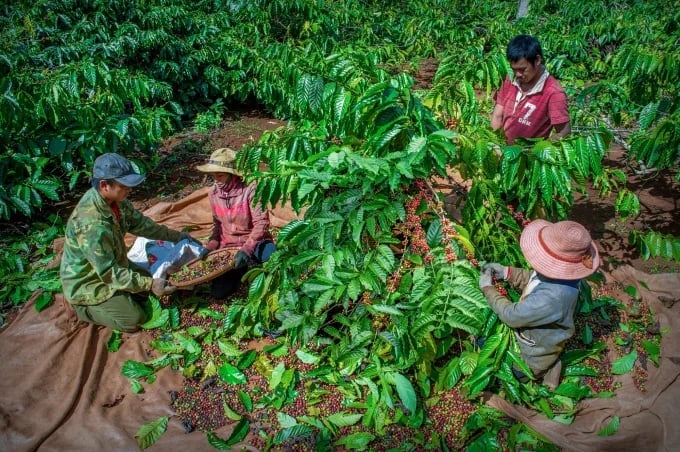November 21, 2025 | 12:33 GMT +7
November 21, 2025 | 12:33 GMT +7
Hotline: 0913.378.918
November 21, 2025 | 12:33 GMT +7
Hotline: 0913.378.918

In 2023, the EU imports coffee from Vietnam to reach 652,000 tons, worth 1.66 billion USD, down 1.4% in volume and down 0.02% in value compared to 2022. Photo: TL.
The reason why the European Union (EU) reduced coffee imports in 2023 is due to economic recession and high inflation, causing people to tighten spending.
Regarding supply structure, in 2023, the EU's coffee imports from the internal market will reach approximately 1.31 million tons, worth $ 9.26 billion, down 6.8% in volume and 0.1% in value compared to 2022. In particular, traditional coffee sources within the EU include: Germany, Belgium, Italy, the Netherlands, and France.
For foreign markets, in 2023, the EU imported 2.74 million tons of coffee, worth $ 11.53 billion, down 10% in volume and 17% in value compared to 2022.
Of which, the EU imported coffee from Brazil reaching 921.8 thousand tons, worth nearly $ 3.57 billion, down 11.6% in volume and 24% in value compared to 2022. Brazil's coffee market share in the EU's total imports from the world decreases from 23.41% in 2022 to 22.74% in 2023.
EU coffee imports from Vietnam reached 652,000 tons, worth 1.66 billion USD, down 1.4% in volume and down 0.02% in value compared to 2022. Vietnam's coffee market share in the EU's total imports from the world will increase from 14.85% in 2022 to 16.08% in 2023.
In 2023, the EU reduced coffee imports from Colombia and Switzerland markets but increased imports from Honduras.
Many forecasts show that, although the EU reduced coffee imports in 2023 when the economy recovers, European demand for coffee will increase again.
According to the European Coffee Federation, the EU has the highest per capita coffee consumption in the world, although consumption levels in member markets vary.
The size of the European coffee market is expected to reach $ 47.88 billion in 2024 and is forecast to reach $ 58.14 billion in 2029, an average growth of 3.96% in the period 2024 - 2029.
Coffee is one of the most popular drinks in Western Europe because it is deeply ingrained in culture and widely used in consumers' daily lives. In addition, the demand for coffee is also increasing in the region due to the number of new coffee shops opening, the growth of coffee shop chains and the increasing number of people buying coffee machines. Therefore, Europe is considered a large potential market that any coffee-producing country wants to exploit.
Translated by Hoang Duy

(VAN) A surge in Ukrainian egg exports, largely driven by soaring sales to the UK over the last few years, has notably pushed up egg prices on the domestic market.

(VAN) The price of Arabica Catimor coffee in Quang Tri is currently at VND 25,000–27,000/kg (fresh cherries), the highest level ever recorded

(VAN) 'From the coffee story, we can think deeper and further about the crop production sector - from development orientations and value-chain organization to international integration,' assessed Dr Le Quoc Doanh.
/2025/11/18/2431-0-161627_248.jpg)
(VAN) Viet Nam accounts for 43% of the world's export volume of Robusta coffee. However, the Vietnamese Robusta coffee brand has yet to gain broad recognition on the global market.
/2025/11/18/5617-2-125215_406.jpg)
(VAN) The consumption demand for premium, healthy, and cold-brew tea products is rising globally, including in the Thai market, opening new opportunities for Viet Nam.

(VAN) The 3F+ model aims for selective resource management, regenerative protection, green education and consumption, all intrinsic to Dabaco’s sustainable development strategy.

(VAN) Carefully packed tea bags, neatly arranged inside containers, begin their 5,000-kilometer journey to Afghanistan, carrying with them the aroma of mountain forests and the pride of Lai Chau province.